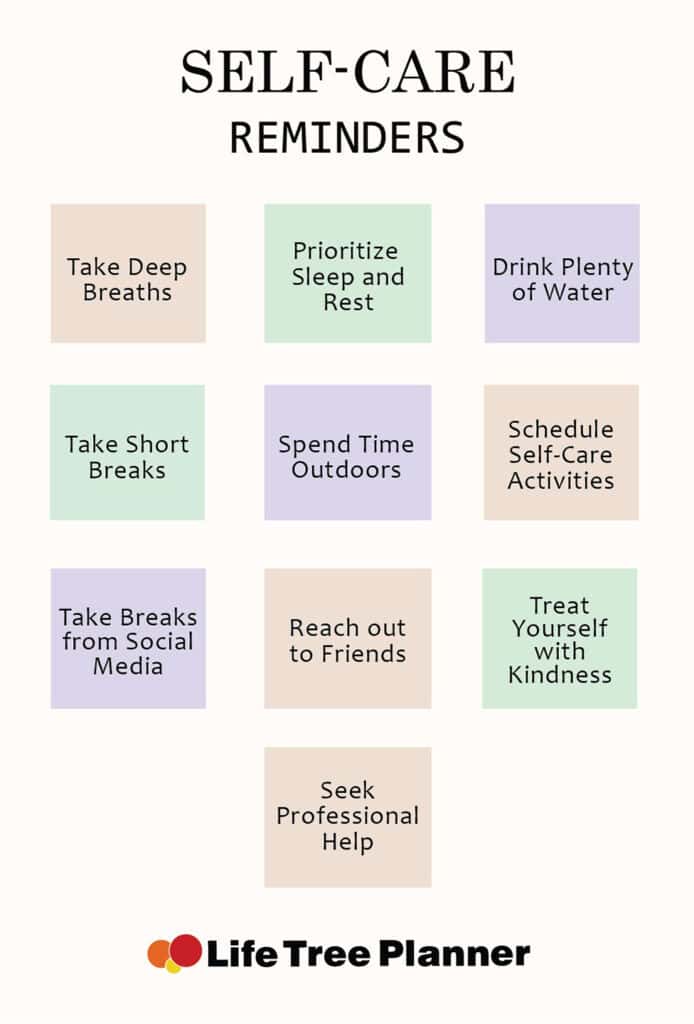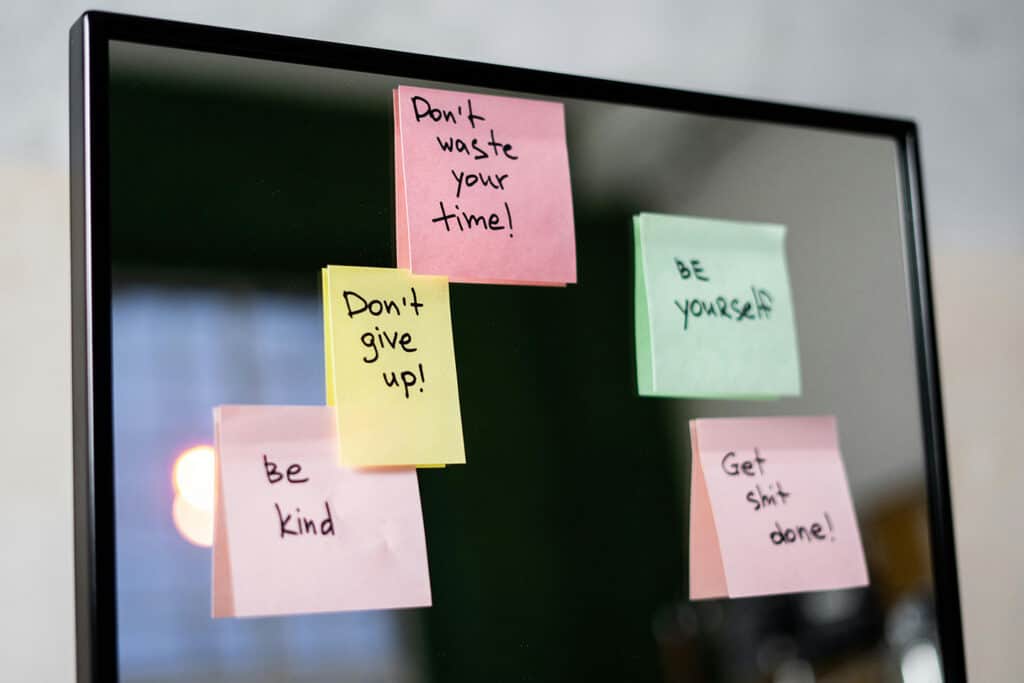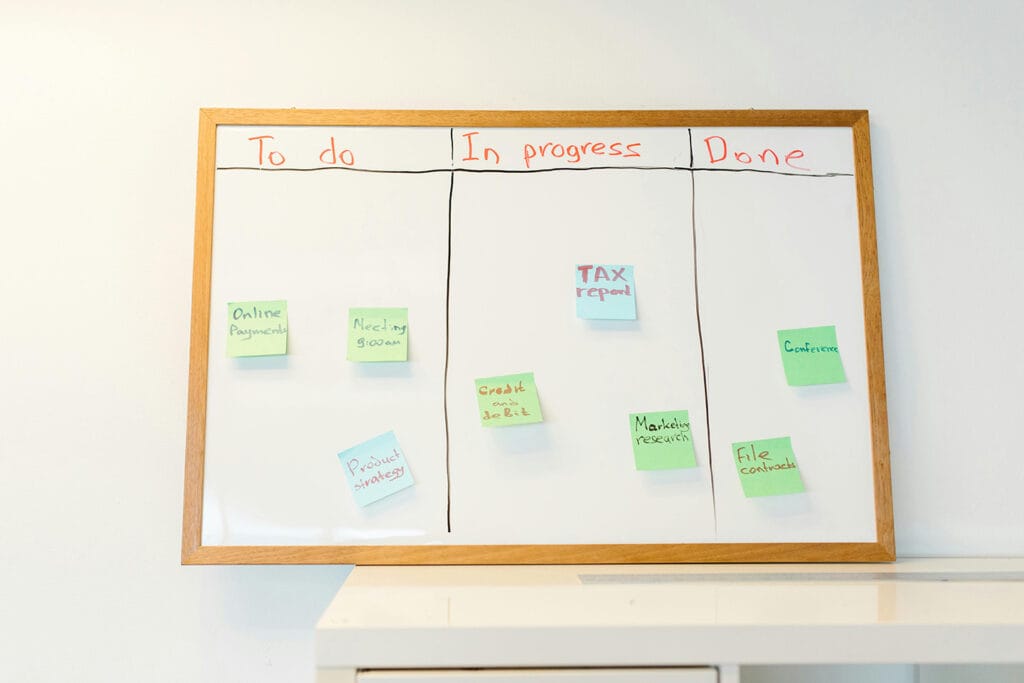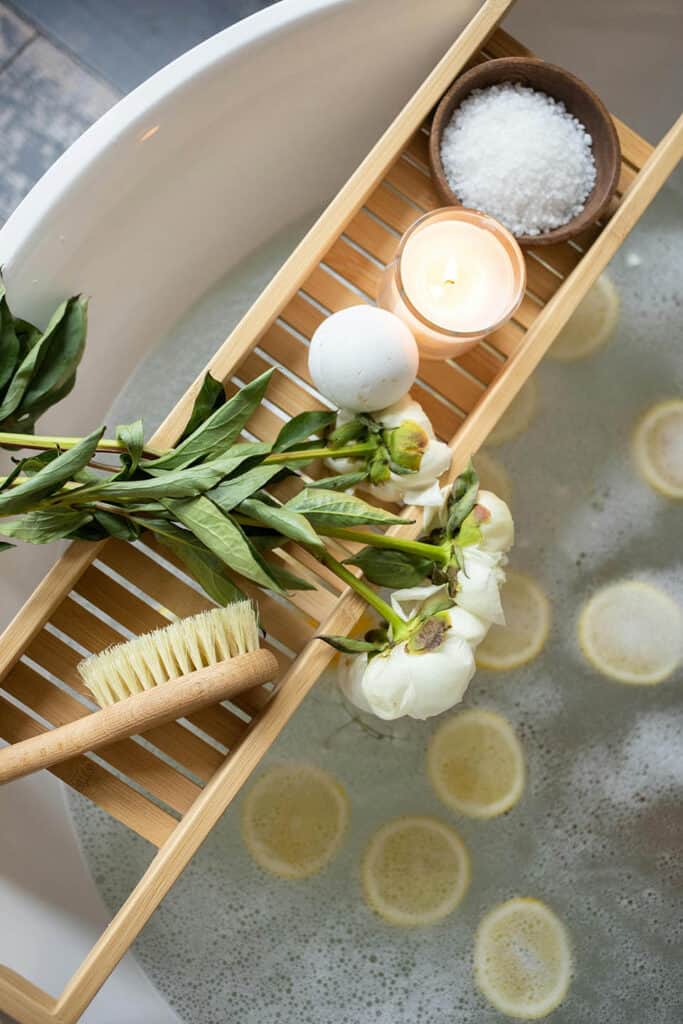

In the fast-paced world we live in, it’s easy to forget about taking care of ourselves. That’s where self-care reminders come in. They’re like little notes to ourselves, reminding us to slow down and look after our well-being.
In a world where everyone seems busy all the time, self-care often gets put on the back burner. But it’s important to remember that taking care of ourselves isn’t a luxury – it’s essential for our health and happiness.
In this article, we’ll explore why self-care reminders are so important and how they can help us feel better in our day-to-day lives. These reminders are like friendly nudges, encouraging us to take a moment for ourselves even when life gets hectic.
We’ll look at 10 simple self-care reminders, their tips and benefits that anyone can use. From taking deep breaths to spending time outdoors, these reminders are easy to follow and can make a big difference in how we feel.
So if you’ve ever felt stressed out or overwhelmed, don’t worry – you’re not alone. Join us as we discover how self-care reminders can help us feel happier, healthier, and more connected to ourselves.
Here are 10 self-care reminders to prioritize your well-being:

- Take Deep Breaths: Deep breathing calms the nervous system, reducing stress and promoting relaxation.
- Prioritize Sleep and Rest: Quality sleep rejuvenates the body and mind, essential for overall health and vitality.
- Drinking Plenty of Water: Hydration supports bodily functions, improves concentration, and enhances mood.
- Take Short Breaks: Regular breaks boost productivity, creativity, and mental clarity throughout the day.
- Spend Time Outdoors: Nature boosts mood, reduces stress, and promotes overall well-being.
- Schedule Self-Care Activities: Plan time for activities you enjoy to recharge and replenish your energy.
- Take Breaks from Social Media: Limiting social media reduces comparison, stress, and screen time.
- Reach out to Friends: Social connections provide support, joy, and a sense of belonging.
- Treat Yourself with Kindness: Practice self-compassion, embracing imperfection and nurturing self-love.
- Seek Professional Help: Don’t hesitate to seek help from a therapist or counselor when needed. It’s a courageous step towards self-care and healing.
See also Life Planning: Setting Goals, Defining Values, and Finding Purpose
The Importance of Self-Care

Self-care is essential for maintaining overall well-being and mental health. Incorporating a self-care night routine can significantly reduce stress and promote relaxation. Engaging in the art of self-care helps individuals reconnect with themselves, helping a sense of peace and balance.
Utilizing a self-care planner ensures that time is dedicated to activities that nurture the body and mind, making self-care a consistent part of daily life. Prioritizing self-care can enhance productivity, boost self-esteem, and improve emotional resilience, leading to a healthier, more fulfilling life.
Reasons Why Self-Care is Important and How to Overcome Challenges:
- Reduces stress and promotes relaxation: Set aside dedicated time for relaxation activities such as reading, meditation, or a warm bath.
- Enhances productivity and focus: Use a self-care planner to schedule regular breaks and activities that recharge your energy.
- Boosts self-esteem and confidence: Engage in positive self-talk and activities that make you feel good about yourself, like exercise or hobbies.
- Improves emotional resilience: Practice mindfulness and seek support from friends, family, or professionals when needed.
- Helps a sense of balance and well-being: Establish a routine that includes time for work, rest, and play, ensuring all aspects of your life are addressed.
Selfcare Reminder Activities

These gentle prompts serve as anchors in the storm of daily life, guiding us back to the essential practice of self-care. They offer a moment of calm, reminding us to take a break and prioritize our mental health.
There is no shame in needing these reminders; they inspire us to recognize when we’re neglecting our wellness. By writing them down and integrating them into our routines. With self-care reminders, we empower ourselves to make it happen, one mindful moment at a time.
Here are 10 Self care Activities to add in your life:
1. Take Deep Breaths

When overwhelmed, taking deep breaths is a powerful act of self-care. In the whirlwind of life, it’s easy to forget that we deserve moments of tranquility. Deep breathe not only calms anxiety but also helps mental clarity and emotional stability. It’s like drinking in fresh air for the soul.
By listening to our bodies and seeking support, we acknowledge the importance of our health and well-being. Each inhale and exhale is a reminder that we are taking care of ourselves, even in the busiest of weeks.
In that moment, among the chaos, there’s hope, the hope that feels good, simply because we’re honoring ourselves as a person.
Here are 10 reasons why deep breathing is important as a self-care reminder:
- Reduces stress and anxiety: Activates the body’s relaxation response, helping to calm the mind.
- Improves mental clarity and focus: Increases oxygen supply to the brain, enhancing cognitive functions.
- Lowers blood pressure: Slows the heart rate and dilates blood vessels, leading to lower blood pressure.
- Enhances overall lung capacity: Strengthens the lungs and improves respiratory efficiency.
- Boosts immune system: Increases oxygen levels, which supports the immune system’s function.
- Promotes better sleep: Helps relax the body and mind, making it easier to fall and stay asleep.
- Increases oxygen flow to the brain: Ensures that the brain receives sufficient oxygen, which is crucial for optimal functioning.
- Helps in emotional regulation: Provides a tool to manage emotions and reduce reactivity.
- Supports digestive health: Promotes relaxation, which can improve digestion and reduce stress-related digestive issues.
- Encourages mindfulness and relaxation: Facilitates a mindful state, fostering a sense of calm and presence.
2. Prioritize Sleep and Rest

Prioritizing sleep and rest is paramount for overall well-being. Establishing healthy sleeping habits not only ensures a rejuvenated body but also helps mental clarity and emotional stability. Among life’s stressors and worries, a good night’s sleep feels like a sanctuary, nurturing happiness and resilience.
By prioritizing rest, individuals treat themselves with kindness, avoiding the detrimental effects of sleep deprivation on both physical health and relationships. Use deep sleep music and 10minutes sleep meditation techniques as a beginner.
Parents, in particular, benefit from this practice, as adequate rest enables them to be present and focused, being calm in their interactions. Making sleep a priority is a free and powerful act of self-care that heals, nurtures, and empowers.
Here are 10 Tips on how to sleep early:
- Create a bedtime routine: Establish a consistent pre-sleep routine to signal your body that it’s time to wind down.
- Set a regular sleep schedule: Go to bed and wake up at the same time every day, even on weekends.
- Limit screen time before bed: Avoid using phones, computers, and other electronic devices at least an hour before bedtime.
- Create a relaxing sleep environment: Ensure your bedroom is cool, dark, and quiet.
- Limit caffeine and alcohol intake: Avoid consuming caffeine and alcohol in the hours leading up to bedtime.
- Exercise regularly: Engage in regular physical activity, but avoid vigorous exercise close to bedtime.
- Watch your diet: Avoid heavy or large meals within a couple of hours of bedtime.
- Practice relaxation techniques: Engage in activities such as reading, meditation, or deep breathing exercises before bed.
- Limit naps: Avoid taking long naps during the day, especially in the late afternoon or evening.
- Seek professional advice if needed: If you continue to have trouble sleeping, consult a healthcare professional for further guidance.
3. Drinking Plenty of Water

Staying hydrated by drinking plenty of water is a powerful habit that can help individuals overcome numerous challenges and accomplish their daily goals. By making water consumption a priority, individuals can harness the power of hydration to fuel their bodies and minds.
A friendly reminder to drink water throughout the day can help maintain focus and productivity, ensuring that individuals stay refreshed and energized. Whether at work, home, or on-the-go, having friends or colleagues to remind each other to drink water can turn this simple act into a collective effort towards better health and well-being.
So, let’s raise a glass and make staying hydrated a top priority!
Here are the 10 benefits of drinking plenty of water:
- Maintains bodily functions: Supports digestion, circulation, and temperature regulation.
- Improves physical performance: Boosts energy levels and endurance during exercise.
- Boosts skin health: Keeps skin hydrated and healthy-looking.
- Aids digestion: Helps break down food and prevent constipation.
- Supports kidney function: Assists in flushing out toxins and preventing kidney stones.
- Regulates body temperature: Helps maintain optimal temperature through sweating.
- Enhances cognitive function: Improves focus and concentration.
- Promotes weight loss: Controls calorie intake and boosts metabolism.
- Prevents headaches: Reduces dehydration-related headaches.
- Supports joint health: Keeps joints lubricated and reduces discomfort.
See also True Love And Understanding: 15 Foundations of Deep Relationships
4. Take Short Breaks

Taking short breaks during work or study isn’t just a luxury, it’s a vital aspect of maintaining mental well-being. In the hustle of the day, pausing for a moment can reset your energy levels, alleviate feelings of anxiety, and boost productivity.
Whether it’s a brief walk outdoors, a chat with a friend, or a moment to simply breathe, these breaks serve as a reminder to respect your mental health.
Connecting with loved ones or engaging in activities you enjoy can also provide a much-needed reprieve from stress. Follow these moments of self-care and hope for a more balanced week ahead.
Here are 10 benefits of taking short breaks at work:
- Increased productivity
- Improved focus and concentration
- Reduced stress and fatigue
- Enhanced creativity and problem-solving skills
- Better physical health, including reduced risk of repetitive strain injuries
- Improved mood and overall well-being
- Increased job satisfaction and morale
- Enhanced work-life balance
- Better communication and collaboration with colleagues
- Opportunity for relaxation and mental recharge
5. Spend Time Outdoors

Spending time outdoors offers an escape into nature. Whether it’s a leisurely walk through lush or a moment to simply breathe in the fresh air, connecting with the natural world can be profoundly transformative.
As you step outside, you recognize the vastness of the world beyond the confines of your daily self-love routine. Among the challenging demands of life, nature provides solace and inspiration, reminding you that worries of the past and anxieties of the future matter little in the present moment.
So, shed the guilt, wear your most comfortable shoes, and allow yourself to write a new chapter of self-discovery and renewal, one step at a time.
Here are 9 benefits of spending time outdoors:
- Improved mood and mental well-being
- Increased vitamin D absorption from sunlight
- Enhanced relaxation and stress relief
- Enhanced creativity and cognitive function
- Better concentration and focus
- Opportunities for physical activity and exercise
- Connection with nature and the environment
- Potential for social interaction and bonding with others
- Renewed sense of energy and vitality
6. Schedule Self-Care Activities

In the hustle of life, scheduling self-care activities and a love checklist isn’t just an option, it’s a necessity. By prioritizing time for self-care, individuals can nurture their body, acknowledge their feelings, and honor their personal needs.
Recognizing the importance of self-care means more than just writing it down on a calendar; it’s about actively making space for activities that inspire and rejuvenate.
Whether it’s a quiet walk in nature, a heartfelt conversation with a loved one, or engaging in creative pursuits, scheduling self-care helps break free from the cycle of worrying and past hurt. Accept the power of self-care scheduling to cultivate a life filled with inspiration and well-being.
7. Take Breaks from Social Media

In an era dominated by constant connectivity, taking breaks from social media has become essential for preserving mental well-being. When we write, talk, or scroll endlessly, we may find ourselves trapped in a cycle of comparison and worrying.
Stepping away from the digital world allows us to reconnect with reality, find inspiration in the present moment, and nurture genuine connections offline. By having moments of silence and solitude, we create space for reflection and rejuvenation.
Letting go of the constant need for validation online frees us to explore our true passions and priorities and a deeper sense of fulfillment and authenticity.
Here are 10 Tips on how to take break from Social Media:
- Set specific time limits: Allocate designated periods for social media use each day to prevent excessive screen time.
- Use app blockers: Install apps that restrict access to social media platforms during certain hours, helping to curb impulse usage.
- Engage in offline activities: Pursue hobbies, exercise, or spend time with friends and family to divert attention away from social media.
- Create boundaries: Establish tech-free zones or times, such as during meals or before bed, to reduce dependency on social media.
- Practice mindfulness: Stay present in the moment by focusing on activities or surroundings without digital distractions.
- Unfollow accounts selectively: Curate your social media feed by unfollowing accounts that contribute to stress or negative feelings.
- Schedule regular breaks: Take short breaks from social media throughout the day to recharge and maintain a healthy balance.
- Use alternative communication methods: Connect with friends and loved ones through phone calls or in-person interactions instead of relying solely on social media.
- Prioritize offline connections: Invest time in building and nurturing relationships outside of social media platforms for more meaningful interactions.
- Monitor usage patterns: Keep track of your social media habits and adjust settings or behaviors accordingly to maintain a healthy relationship with technology.
8. Reach out to Friends

When facing difficult times, it’s essential to remember that you’re not alone. Don’t be ashamed to reach out to friends or loved ones for support. Whether you’re struggling to get out of bed or feeling like you can’t handle it anymore, sharing your feelings with someone you trust can make all the difference.
They want to hear from you and offer their help. Opening up allows you to lighten the burden and gain perspective. Remember, true strength lies in recognizing when you need assistance and having the courage to ask for it.
9. Treat Yourself with Kindness

Treat yourself with kindness embodies the essence of self-care reminders. In a world that often demands relentless productivity and perfection, it’s easy to overlook the importance of gentleness towards oneself. However, by following this fundamental principle, we unlock a profound shift in our well-being.
Self-care reminders serve as gentle prompts to prioritize compassion towards ourselves. They encourage us to listen to our needs, acknowledge our limitations, and grant ourselves the grace we freely offer to others.
Through this act of kindness, we cultivate a nurturing relationship with ourselves, resilience, inner peace, and a deeper sense of self-acceptance.
Here are 7 ways to treat yourself with kindness every day:
- Practice self-compassion: Be kind to yourself, especially during tough times.
- Challenge negative thoughts: Replace them with positive affirmations.
- Celebrate achievements: Acknowledge your successes, big or small.
- Surround yourself with positivity: Be around supportive people and environments.
- Forgive yourself: Let go of past mistakes and move forward.
- Listen to your needs: Pay attention to what you need emotionally and physically.
- Express gratitude: Focus on the good things in life.
10. Seek Professional Help

Seeking professional help, such as therapy, is a vital aspect of self-care, especially when navigating mental health issues. In the midst of daily self-care reminders, it’s essential to recognize when additional support is needed.
Therapy offers a safe space to explore and address underlying challenges, providing invaluable tools to manage stress, anxiety, and other mental health concerns.
By prioritizing professional help, individuals can be on a journey of healing and self-discovery, enhancing their overall well-being and resilience. Remember, reaching out for support is not a sign of weakness but a courageous step towards nurturing one’s mental and emotional health.
Self-Care as a Daily Reminder

Self-care serves as a daily reminder of our inherent worth and importance among the life. It’s more than a self love checklist, it’s a declaration of self-love and prioritization. In the pursuit of career and wealth, it’s easy to neglect our well-being, but self-care gently nudges us to pause, breathe, and nurture ourselves.
By integrating self-care into our daily routines, we acknowledge that our mental, physical, and emotional health are non-negotiable.
It’s a commitment to ourselves, ensuring we show up fully in all aspects of our lives, from the boardroom to the bedroom, fueled by a deep reservoir of self-love and care.
See also Money Management: A Guide to Budgeting and Accounting for Individuals and Families
Selfcare Reminders: A Recap
In the cacophony of responsibilities and demands, self-care reminders emerge as beacons of balance and resilience. They beckon us to prioritize not only our work but also our relationships and personal well-being.
As we navigate the intricacies of family bonding and professional duties, self-care serves as a compass, guiding us toward harmony. It’s a gentle reminder that our worth isn’t solely defined by our achievements but by how we nurture ourselves and those around us.
By honoring our need for self-care, we not only achieve a better work-life balance but also cultivate deeper connections and fulfillment within our families and communities.


